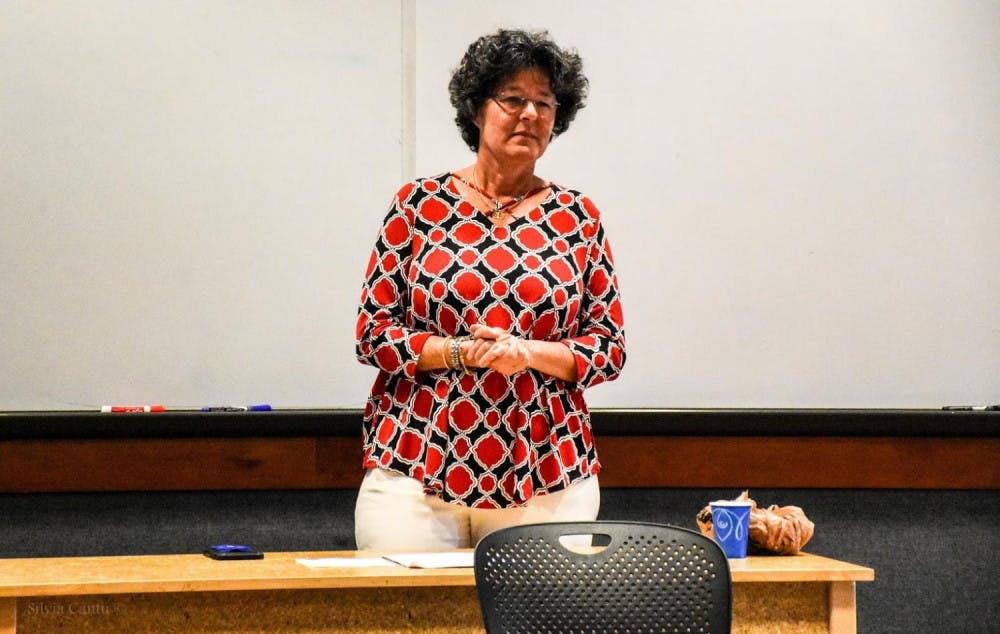In the early morning hours of Sunday, Jan. 29, Judge Allison D. Burroughs of the District Court for Massachusetts sat inside a Boston courthouse and made an easy decision with nationwide ramifications. Burroughs, alongside Magistrate Judge Judith G. Dein, issued a temporary restraining order against President Donald J. Trump’s travel ban, which had blocked entry into the United States for refugees and immigrants from seven Muslim-majority countries. Burroughs and Dein delayed Trump’s order for seven days, dealing a significant blow to the president’s agenda and transforming Boston’s Logan Airport into a temporary safe haven for affected travelers.
Last week, Burroughs, who graduated from Middlebury in 1983, returned to campus to provide an overview of her life and career, including the January case that thrust her into the national spotlight.
“I make a lot of super hard decisions every month,” she told an audience of students at the Hillcrest Environmental Center on Thursday, Sept. 14. “This travel ban case, to be perfectly honest, was not a hard decision. It was obvious, in my view, what needed to be done.”
“My job is not to write the law, my job is to apply the facts to the law,” Burroughs explained. “Maybe people think that it takes courage to stand up to a President of the United States. But my job isn’t to consider the politics of it — my job is to look at the law and to look at the facts. And it’s very clear that the president, in my view, didn’t have the authority to keep green card holders from entering the country. So, in terms of application of facts to law, it was very straightforward.”
A STEADY RISE
The travel ban case, Burroughs conceded, is likely to represent her “five minutes of fame.” But those five minutes came only after decades of advancements through the legal sphere, beginning as a low-level attorney in the Department of Justice. After a series of lucky breaks, Burroughs eventually became the lead prosecutor on a high-profile drug trafficking case in Philadelphia, which brought her local recognition and fulfilled a lifelong dream of trying criminal cases.
The lesson from her steady rise through the Justice Department, Burroughs said, was to beware “the danger of holding out for the most perfect thing, rather than the thing that lets you get your foot in the door and gives you a chance to prove yourself.”
Burroughs continued to work in criminal prosecution until 2005, at which point she moved to the private sector. All the while, however, a federal judgeship loomed large in her mind — particularly after numerous failed applications to Senate recommendation committees. Her moment finally arrived in 2014, when Senator Elizabeth Warren recommended Burroughs’s name to President Barack Obama for a seat on the U.S. District Court for Massachusetts.
“People ask me, ‘What was your juice, how did you get in, who did you know?’” Burroughs said. “The only thing I can really attribute it to is sheer perseverance. I went at it and at it and at it. There’s really no shame in trying and being rejected.”
ON CRIMINAL JUSTICE
In her lecture, Burroughs emphasized her willingness to speak candidly about almost any subject. Indeed, she shared that judging itself is a decidedly human enterprise.
“I’m very comfortable with everything I did during my prosecutorial career,” Burroughs said. “[But] as a judge, it is astounding the number of times I read one brief and I think, ‘They have it.’ Then, I read the other brief and I’m like, ‘Maybe they have it.’ By the time a lot of these issues get to me, they’re hard—if it were obvious, the parties would’ve worked it out themselves”
Yet, she cautioned, such subjectivity makes it all the more crucial to minimize bias. While considering the travel ban case, for example, Burroughs stressed that the human interest stories reported in the media were not a factor in her decision.
“If you don’t understand this when you’re applying to be a judge, it is drilled into you at the training you get: your job is just to apply the law to the facts. It’s not a creative position,” she said. “There’s a lot of gray area that requires some judgment calls, but you don’t get to think about what the stories are when you’re making those decisions. I didn’t think about it, I didn’t have the opportunity to think about it, and I’m glad I wasn’t in the position where it would’ve been tempting to think about it.”
Still, Burroughs admitted that the criminal justice system contains structural imperfections, particularly with regard to drug policy.
“I think that we need to have a more thoughtful criminal justice posture, by which I mean more strategic,” Burroughs said. “We can’t just be “prosecute, prosecute, prosecute; jail, jail, jail… It’s going to be very hard to kill drug distribution in this country. To get rid of violent drug distribution seems more worthwhile.”
LOOKING BACK
Despite the long list of achievements that Burroughs recounted in her lecture, she told The Campus afterwards that the phenomenon of “imposter syndrome” — feeling undeserving of one’s own accomplishments — is largely unknown to her.
“I clerked after law school for [federal judge] Norma Shapiro,” Burroughs said. “The one thing clerkship gives you is: you walk away thinking, ‘If all of these buffoons can earn a living, I can too.’ You see people in court that are so terrible and unprepared. So, I come at it thinking, to be good at most things, you don’t have to be the smartest kid in the room. You just have to be the best prepared and willing to work the hardest.”
“I know there’s tons of stuff I don’t know, and I work my tail off to get competent,” Burroughs said. “I’m not the most super-confident person in the world, but I’ve always felt that if you work hard and do your best, that’s all anybody’s doing. That’s all anybody can ask of you.”




